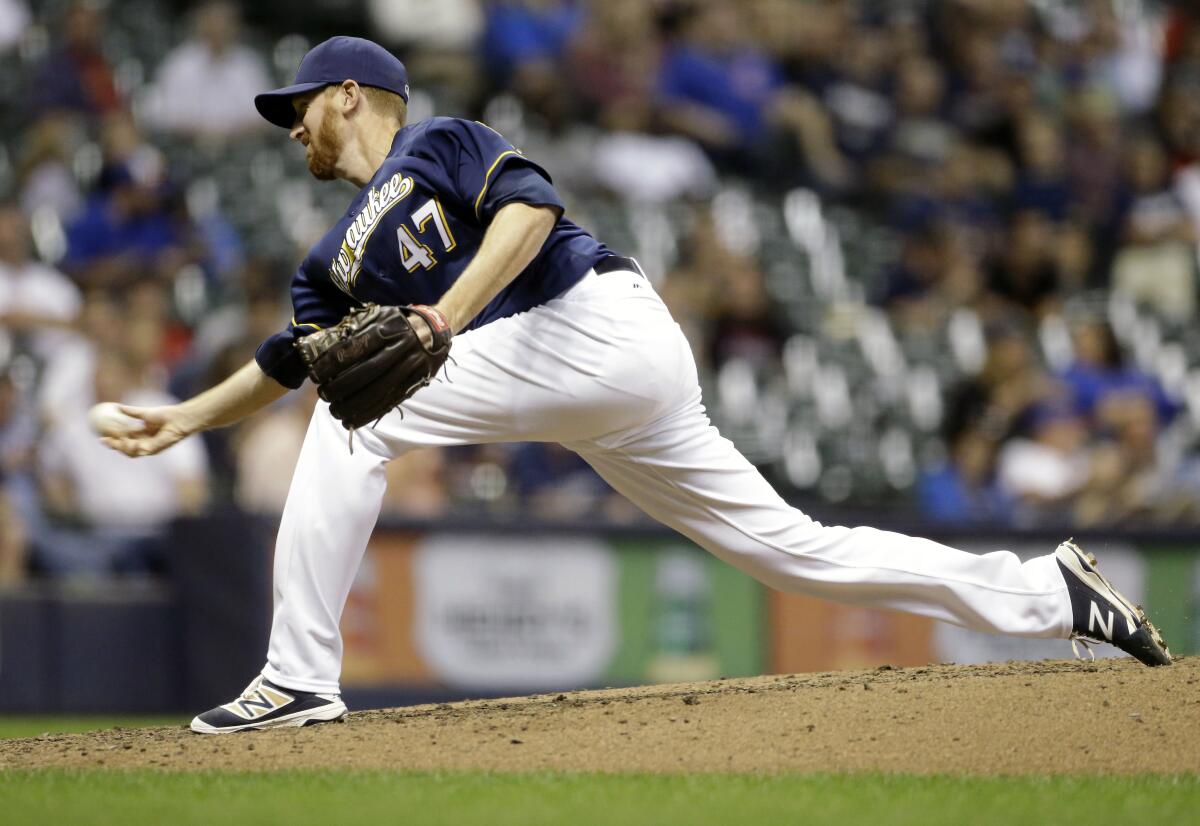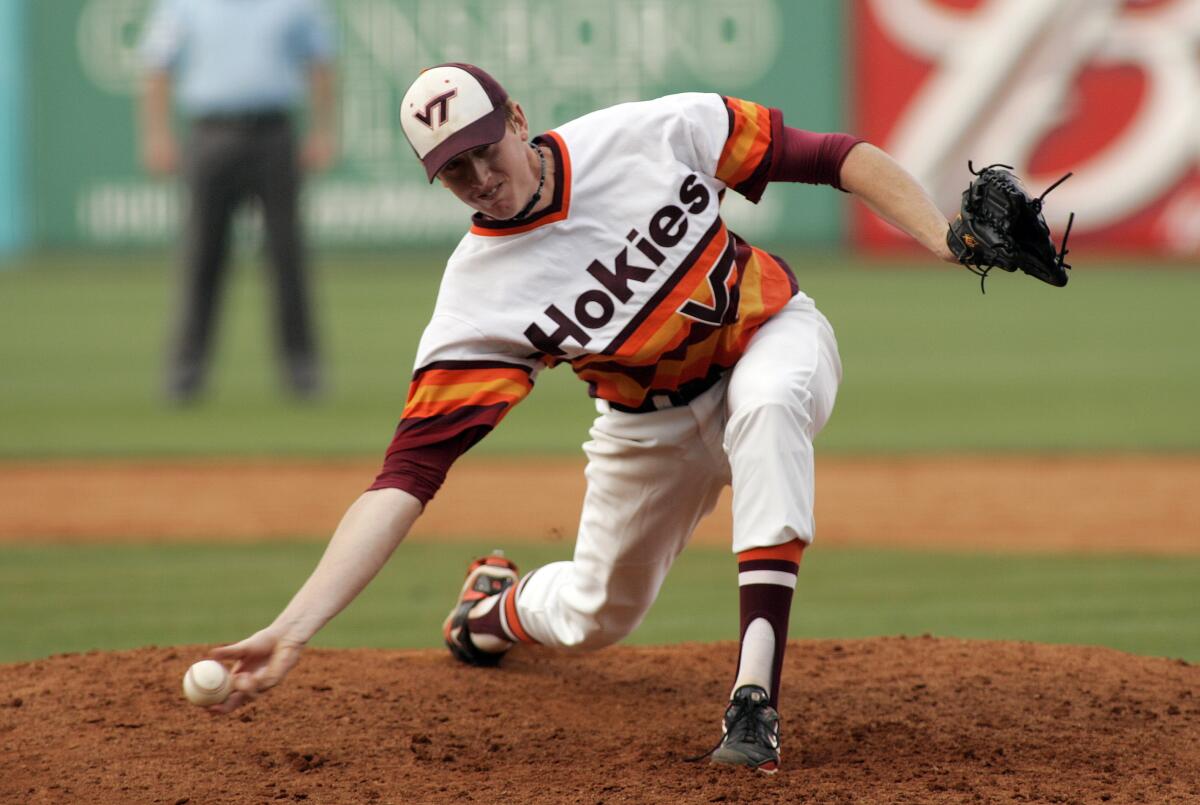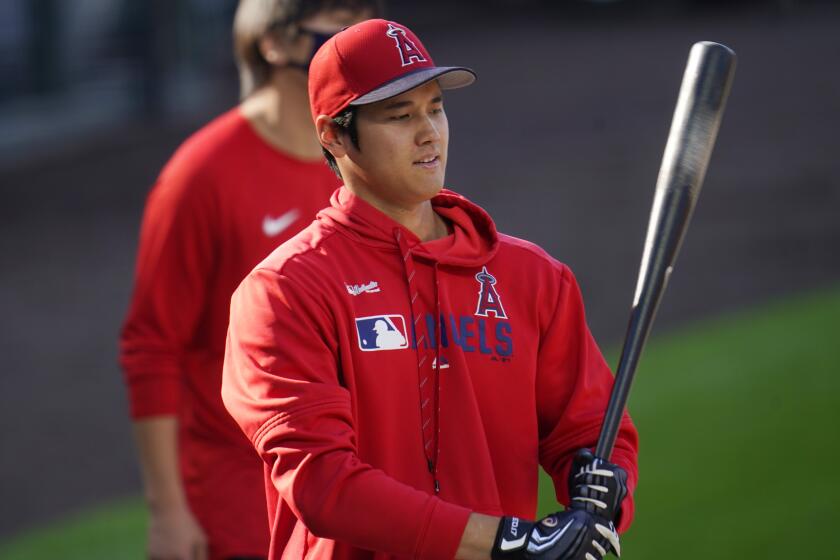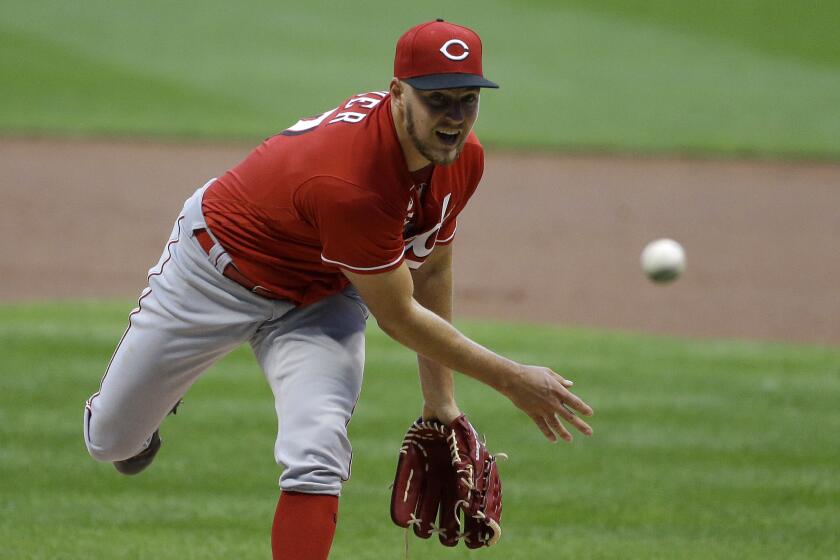Palos Verdes’ Ben Rowen, now with Angels, evolves from submarine delivery to overhand

- Share via
Ben Rowen reached a crossroads in 2018, his nine years of professional baseball netting the lanky right-hander more stops at minor league outposts (13) than big league appearances (12) and little in the way of career earnings.
The former Palos Verdes High School and Los Angeles Harbor College pitcher struggled so much in his first month at triple-A Louisville, going 0-2 with a 9.28 ERA in 10 games, that Cincinnati released him that May, forcing him to finish the season with the independent league Sugar Land (Texas) Skeeters.
Rowen and his wife, Megan, a middle-school teacher, had a 1-year-old daughter, Ryan. Feeling the tug of “the real world,” Rowan thought perhaps it was time he put his Virginia Tech business degree to use and find a job that paid more than his meager minor league salaries.
“At that point, I had to figure out if I still wanted to pitch or not,” Rowen said. “I felt like I had to reinvent myself or add something new. And that’s when I started to relearn how to throw overhand.”
Wait, what? Who doesn’t know how to throw overhand?
The starting pitcher and designated hitter avoids arbitration by agreeing to a two-year, $8.5-million contract with the Angels on Monday.
It had been so long for Rowen, he had to retrain himself.
The 6-foot-4, 210-pound Rowen began throwing sidearm as a high school freshman, dropped down to “full submarine,” as he calls it, in junior college and threw Kent Tekulve-style for nearly a decade in pro ball.
But with his career floundering in 2018, it was time for a change. To add deception to his delivery and variance to the velocity and shape of his pitches, Rowen began mixing in some overhand in 2019, throwing about 80% of his pitches submarine-style and 20% over the top.
A bounce-back 2019 season in Atlanta’s system, where he went 5-3 with a 3.61 ERA in 40 double-A and triple-A appearances, helped earn Rowen a minor league deal and invitation to big league camp with the Angels this spring.
“For me, it was just another thing to make the hitter a little more uncomfortable, to change their eye level,” Rowen said. “It puts another thing in their mind that they have to choose.”
From underneath, Rowen, 32, throws a fastball that tops out at 81-82 mph and a sweeping 70-mph slider. From above, he mixes a 90-mph fastball with a 75-mph curve.

Rowen was not in Atlanta’s 60-player pool last season, and he did not pitch competitively. But former Braves assistant general manager Alex Tamin, who followed new Angels general manager Perry Minasian from Atlanta to Anaheim this winter, liked Rowen’s new hybrid approach enough for the Angels to give him a chance.
“He’s done a nice job with the multiple arm slots and trying to shape pitches differently … and in 2019, he was an organization-saver,” Tamin said. “He threw one inning, three innings, multiple days in a row, he made a few starts. He was extremely versatile and effective.”
Rowen is a longshot to win a bullpen spot in camp, but with teams ramping up from a pandemic-shortened 60-game season to the regular 162-game grind, he could be summoned to Anaheim at some point.
“There’s a lot of focus on the 26th man [on the active roster], but we’re gonna need 35-40 players to help us get through the season,” Tamin said. “We’re always looking to add quality depth, and Ben is a part of that.”
For most pitchers like Rowen — Darren O’Day, Joe Smith, Eric Yardley, Adam Cimber — the transition to submarine style is a last resort, made when careers stall in college or the minor leagues. Rowen is a rarity in that he switched as a 14-year-old.
The Dodgers astonishingly signed Cy Young winner Trevor Bauer to a 3-year, $102-million deal. The best team in baseball just got enormously better.
Former Palos Verdes coach Evan Fujinaga, noting Rowen’s “beanpole” frame and struggles with a traditional delivery, suggested the move, thinking it would benefit Rowen the way it did Ben Grezlovski, a former college teammate who made the team at Florida as a walk-on in 1998, became the Gators’ closer and was a 24th-round pick of the Angels in 1999.
“Honestly, at first, I thought it was kind of a joke,” Rowen said. “But it was something different, unique, and one of those things where if you don’t jump into the deep end with it, you’re not going to be successful. So soon after that, I really bought into it and made it my identity.”
The switch suited Rowen, who was drafted by Texas in the 22nd round in 2010 and reached the big leagues in 2014, pitching to a 4.15 ERA in 8 2/3 innings of eight appearances, including a 3 1/3-inning, one-hit, three-strikeout stint before about 25 family members and friends in Anaheim on June 20.
But Rowen was diagnosed with thoracic outlet syndrome later that season, underwent surgery to remove a rib, and his career spiraled. He was released or designated for assignment by seven organizations in four years and had a 15.00 ERA in his only other big league stint, four games with Milwaukee in 2016.
Rowen persisted. When pitchers and catchers report to camp next week, he will be in an Angels uniform, pursuing his dream.
“I still have that fire to compete, to prove to myself I can do this,” Rowen said. “You hear a lot of guys say, ‘I’m gonna play until they rip the jersey off my back.’ Later in life, I’m not going to have this opportunity to go into a major league clubhouse in spring training and compete with the best in the world, so I’m not gonna pass that up.”
More to Read
Go beyond the scoreboard
Get the latest on L.A.'s teams in the daily Sports Report newsletter.
You may occasionally receive promotional content from the Los Angeles Times.









